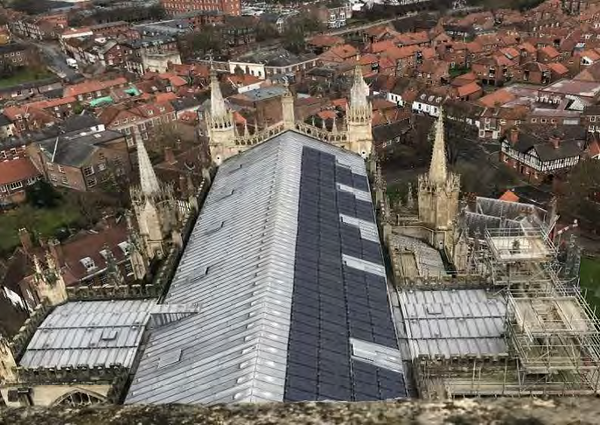Solar panel approval for pioneering York Minster




Plans to install photovoltaic panels on the roof of York Minster have been approved by City of York Council (CoYC) and the Cathedrals Fabric Commission for England.
This important decarbonisation project forms part of the York Minster Neighbourhood Plan and is one of a number of sustainability projects taking place across the Precinct.
As the pioneering example of a heritage estate using a Neighbourhood Plan to map out its future, it seeks to safeguard the Minster for generations to come through a commitment to sustainability, biodiversity and wellbeing.
The 199 panels will be placed on the roof of the South Quire Aisle, originally dating from 1361, and will enable the Minster to generate 75,000 kilowatt-hours of power annually.
As well as contributing to meeting daytime power demand, surplus power generated by the panels will be stored in underground batteries and used to power the cathedral’s evening services and events.
There will also be a panel installed within the Minster itself displaying its energy production and carbon savings as it seeks to promote the importance of decarbonisation to the thousands of local, national and international visitors that appreciate York Minster.
The Dean of York, the Very Revd Dominic Barrington, said: “The Church of England has pledged to be net zero by 2030 and we are proud to be playing a significant role in not only helping to achieve this vision, but also inspiring other cathedrals to follow suit. We are incredibly pleased that City of York Council has recognised the importance of this intervention not just for the Minster, but for the wider city.
“We have consulted extensively with key stakeholders including Historic England and the Cathedrals Fabric Commission for England to ensure that the panels are sensitive to the Precinct’s historic architecture and wish to express our gratitude for their continued support up to this point.”
Alex McCallion, director of works and precinct at York Minster, said: “Through our adopted Neighbourhood Plan, we are committed to being an exemplar for the city and further afield. Our aim is to inspire individuals and other organisations to implement their own small changes to contribute to national and international efforts.
“The exceptional architectural and cultural value of the Minster underpins the international reputation of York as a city, which is why we are so committed to delivering important decarbonisation projects such as this one, in turn setting a leading example for other heritage institutions to follow.
“We thank City of York Council, Historic England, and the Cathedrals Fabric Commission for England for their partnership working in helping to deliver these ambitions as we all find our way to address the climate emergency, which is currently the greatest threat to the fabric of our historic Minster.”